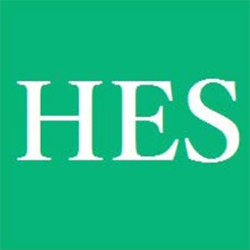Elena Rossi, Magdalen College, Oxford
Taking advantaged of my role as the Peter Gosden Fellow here at the History of Education Society UK, I used the society’s social media platform to post live updates about my experience at the History of Education Doctoral Summer School in June 2023. As many PhD students will be considering apply to HEDSS 2024, I thought it would be helpful to share my experience on our blog as well. Here, I have edited my posts into a narrative of the events so PGRs can witness the full adventure as it was unfolding!
What is the History of Education Doctoral Summer School?
The History of Education Doctoral Summer School is an annual event for postgraduate students in histed. It is a great opportunity for PhD students to discuss their project with fellow doctoral peers and receive comments from prominent scholars in the field. This year’s summer school is being held at the University of Zurich and the conference centre Schloss Au (Pädagogische Hochschule Zürich), Switzerland.
Day 1
Introductions
It has been quite the start to #HEDSS2023! After travelling on the tram and train like a chaotic group of kids on a school trip, we finally made it to Schloss Au for the opening of the Summer School. Yes, that is a castle.
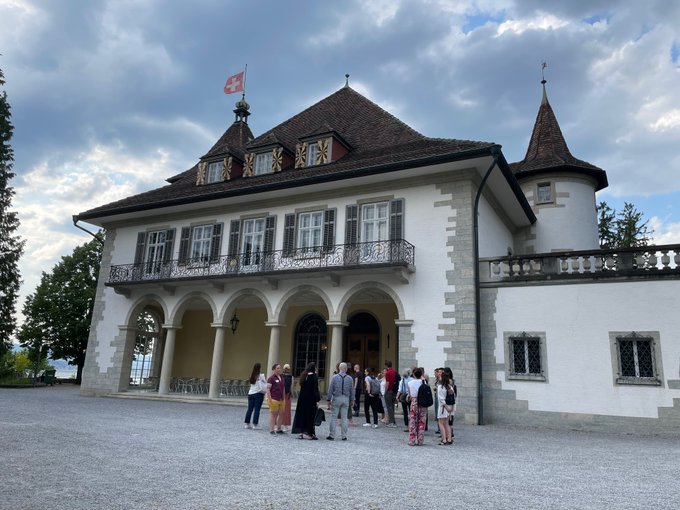
The Summer School was opened by Michèle Hofmann and Frederik Herman, who took us on a lovely trip down memory lane through his experience on HEDSS from his first time in Ghent in 2010. And to round up the introductions, we had Heinz Rhyn, the rector of the Zurich University of Teacher Education, who also spoke about the history of Schloss Au.
Exhibition Tour
Following the opening welcome, we moved on to a guided tour through the prototype of the education exhibition “Panorama Pestalozzianum”, led by Dr Anne Bosche. One of my favourite aspects of the exhibition was the staircase, which may sound odd, but they created an amazing soundscape within the entrance to the exhibition using speakers and recordings.
Another beautiful element was the attic room with these posters. A sneak peak at this amazing exhibition in progress:
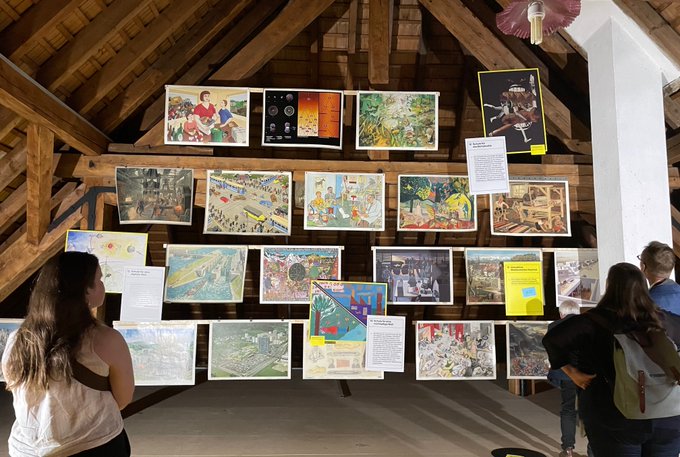
Networking
And to finish the evening, we had drinks and food whilst looking on at the stunning view. It was lovely spending the first few hours of HEDSS2023 getting to know everyone (alongside enjoying some delicious chocolate mousse).
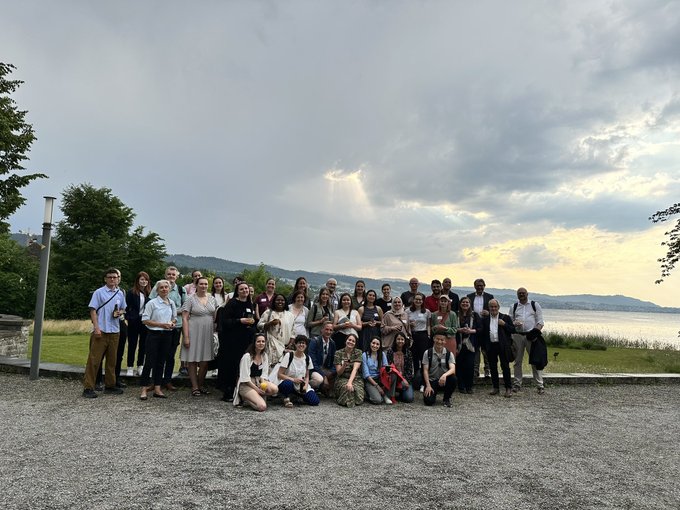
Day 2
Tourists
And we’re off with day 2 of #HEDSS2023! The school group are gathered and up we go to the university in the polybahn!
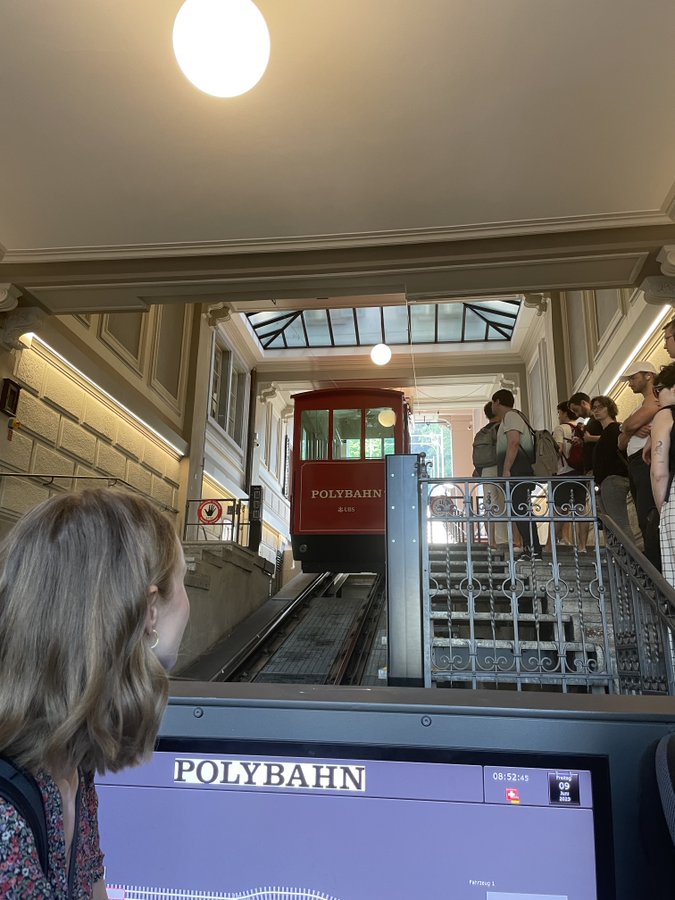
And, of course, we took our moment to be tourists and stopped for photos of the view…
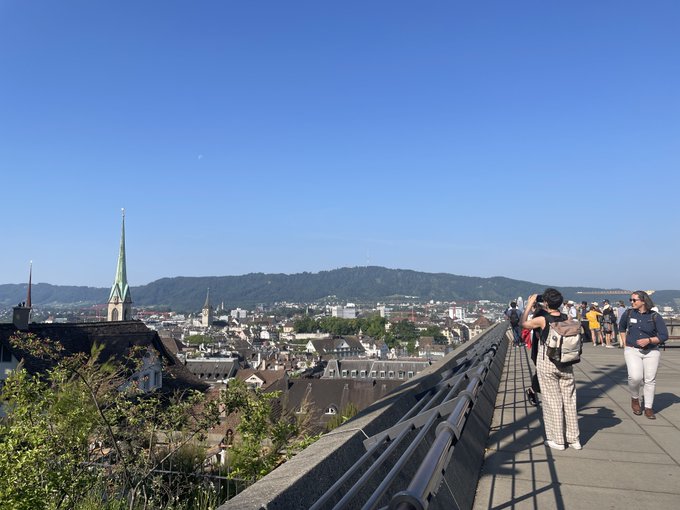
Introductions
First, we had introductions led by Lukas Boser. Everyone was very excited about the merch…
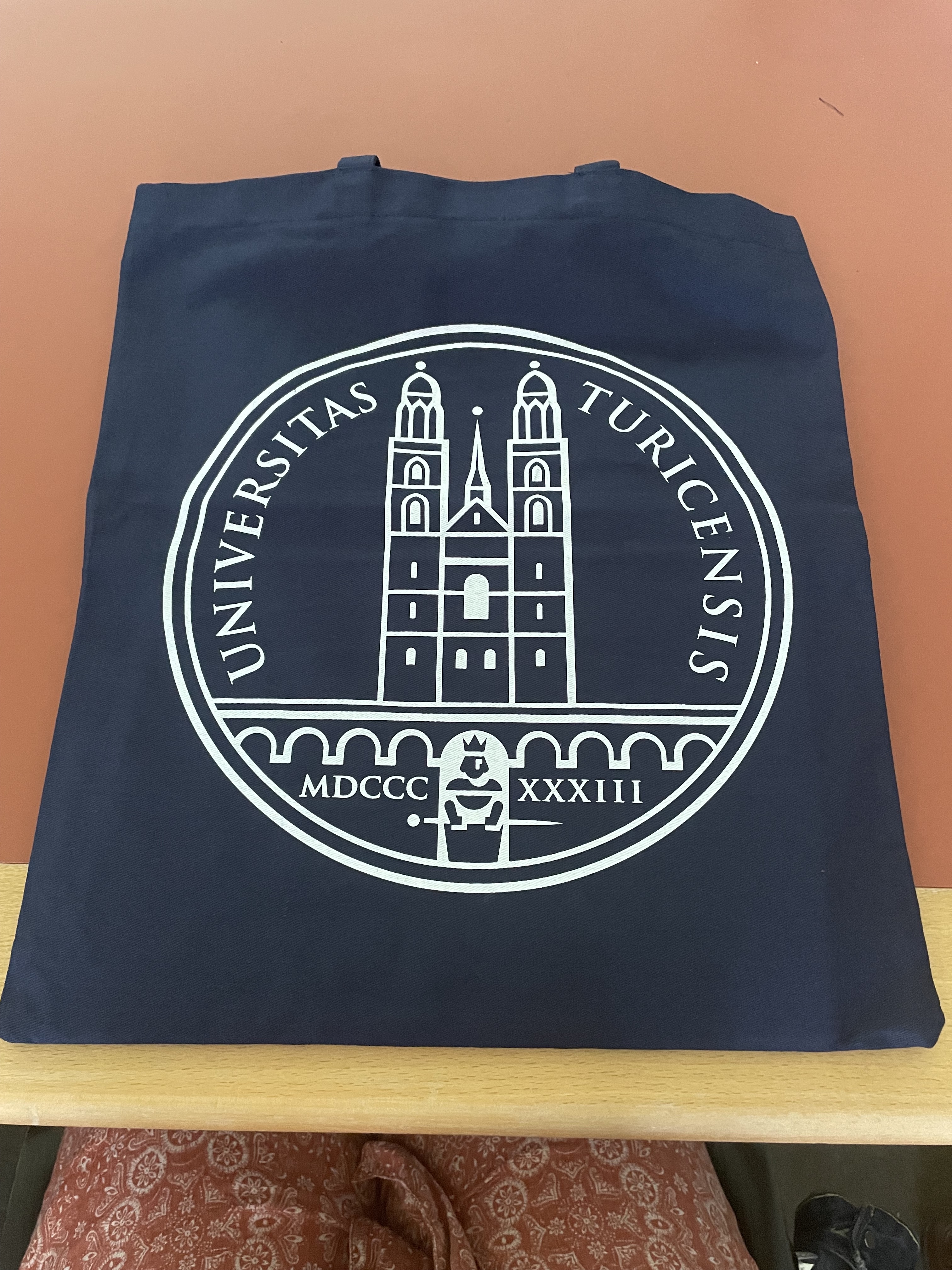
Student Presentations – Part 1
This morning we start with panels where the PhD students present on their research for 10 minutes, followed by 20 minutes of discussion. A really great opportunity to succinctly share your research and get feedback/questions from your peers. There are typically parallel sessions so attendees can choose which to attend.
In Session 1 we have Beth Bhargava (University of Sheffield, UK) discussing ‘Teaching British Imperial History to Children in English Secondary Schools, 1945-1990’ and Kevser Muratovic (University of Vienna, Austria) on ‘Materializing Nation in an Empire Military Education, Bourgeois Elite Formation, and the Ideology of Nationalism’.
Session 2 includes Hugo Wei Li (KU Leuven, Belgium) looking at ‘“Searching for an Ideal Realm of Imagination”: Shu Xincheng’s Promotion of the Dalton Plan and the “Indigenization” of Progressive Educational Reform in the Republic of China’ and Penny Robin Vlies (University of Sydney, Australia) on ‘The Same Learning Under New Stars: Knowledge in Curriculum Reform Policy in the 1950s’
Student Presentations – Part 2
And after a short break we are back with Sessions 3 and 4! Starting Session 3 with Chelsea Rodriguez (University of Groningen, The Netherlands) ‘All the (School) News That’s Fit to Print: A History of Postwar Education News in the New York Times’, followed by Sphoorti (Jawaharlal Nehru University, New Delhi, India) ‘Public Debates on the Education of Dalits during the 1870s to 1950s: Actors, Agendas, and Movements’.
Session 4 hosts Ingrida Ivanavičė (Vilnius University, Lithuania) on ‘History of Roma Education in Lithuania: Oral History Discourse’ and Wojciech Lasota (University of Warsaw, Poland) ‘The Bursa of the Orphans’ Home of Janusz Korczak (1923–39): The Organizational Culture – The Educational Environment – The Jewish-Polish Borderland’.
Lunch Break!
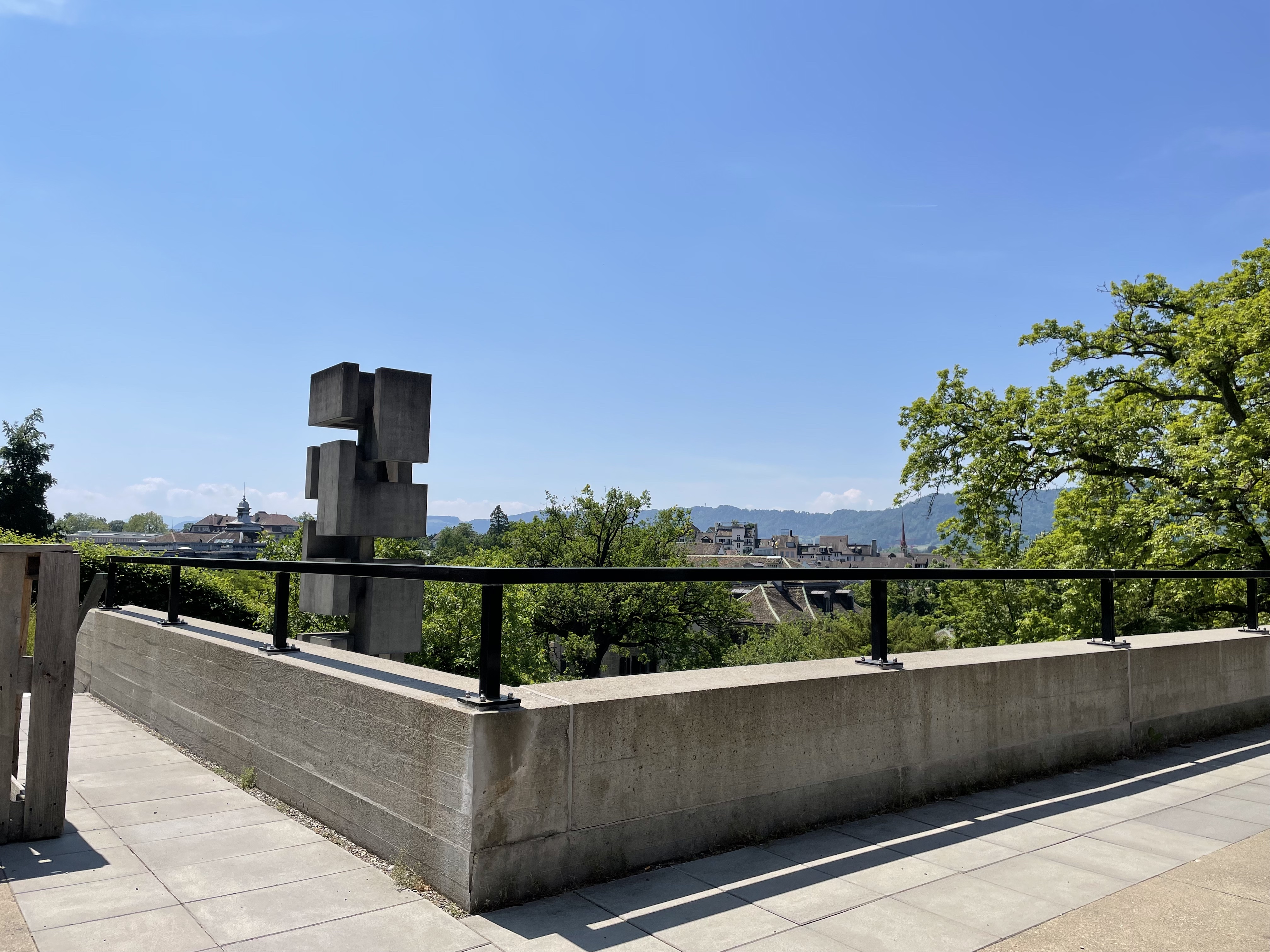
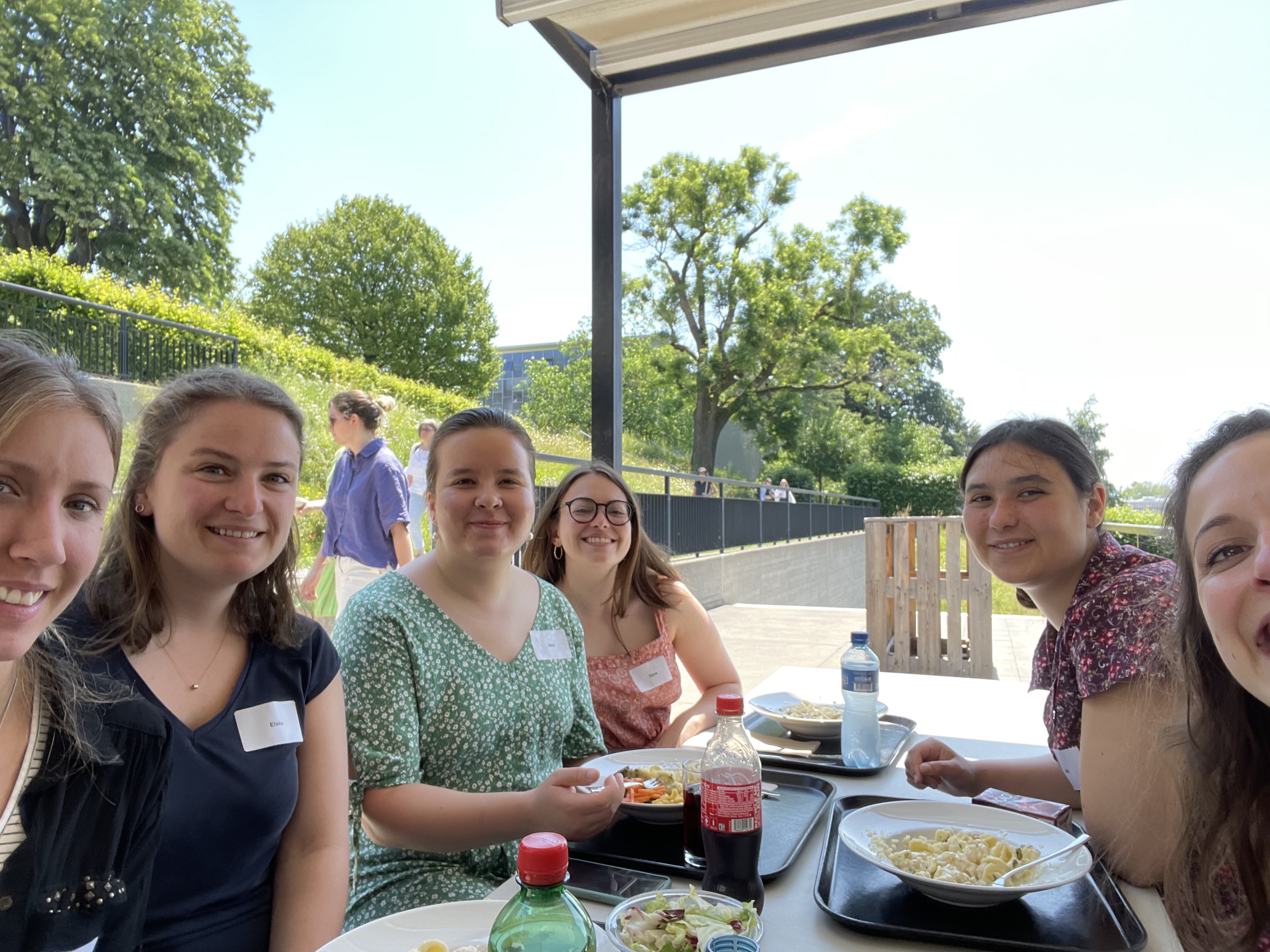
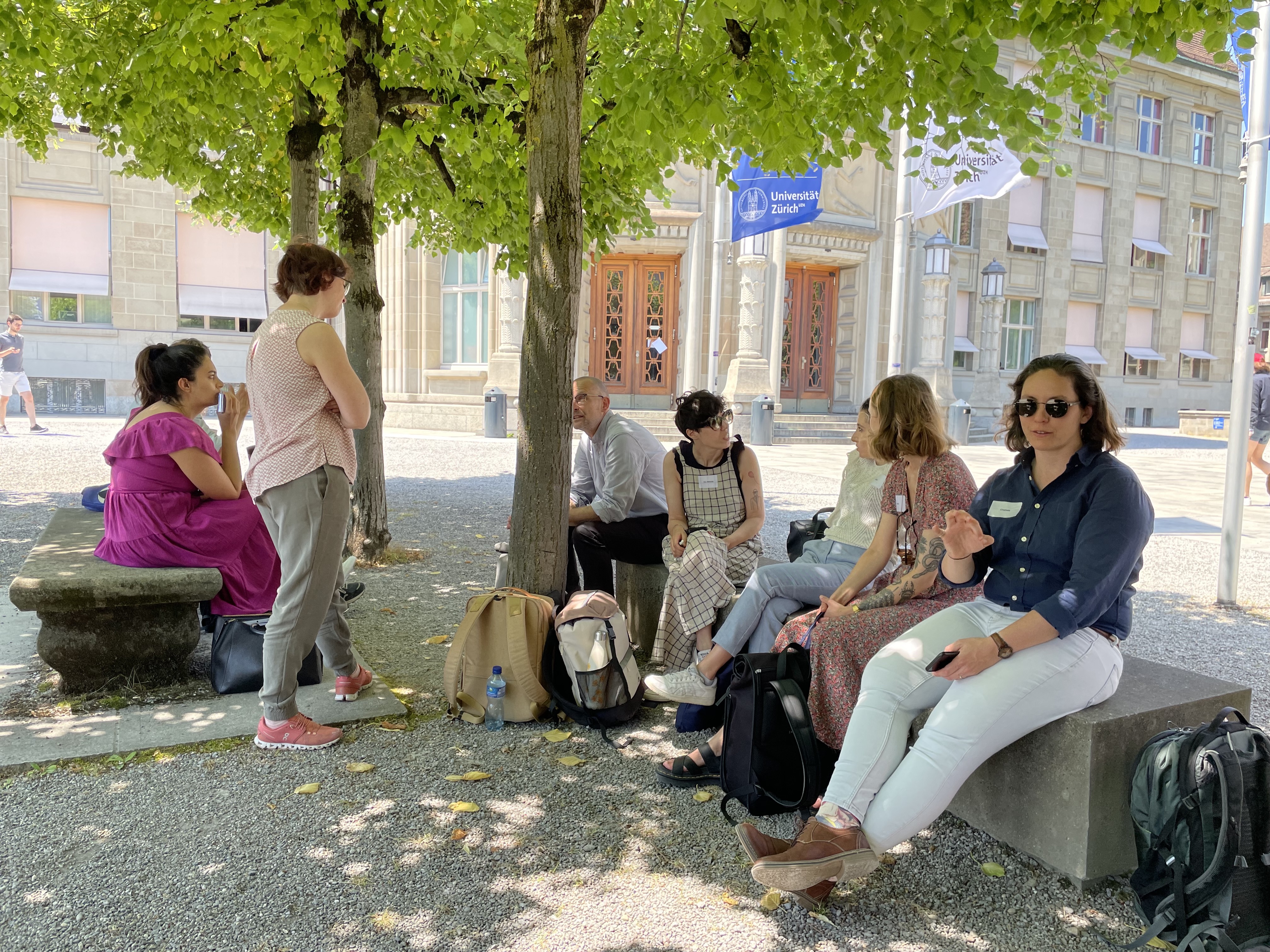
Workshop 1: Memory Work Through Objects, Images, and Imaginaries
After a morning of presentations (and a delicious lunch), we now move onto the first workshop led by Lisa Rosén Rasmussen (Aarhus University, Denmark): Memory Work through Objects, Images, and Imaginaries. Each student had to bring in an image or object from their research to use within this session.
Our group had this photo and had to narrate a story from the perspective of an object. We chose the drawers, who were feeling very sad that they were missing the lesson on the alphabet so could not read the work students posted to them.
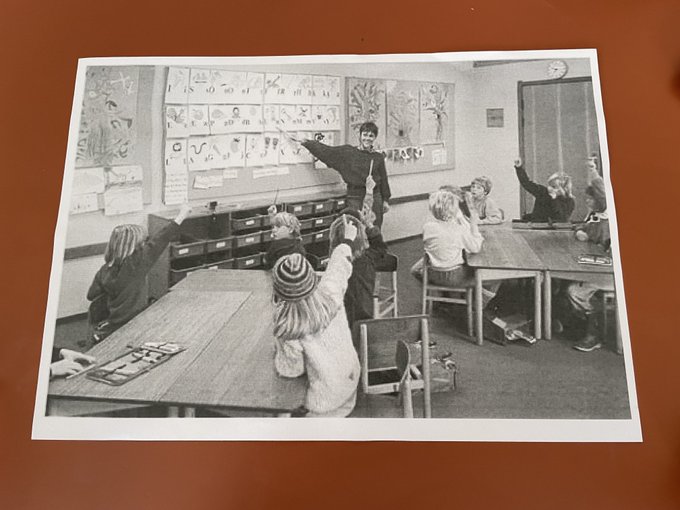
There was also an emotive story from another group about school uniform being left behind as students grew up, but they would always remember the lessons and carry the knowledge with them.
Student Presentations – Part 3
And now we move back to PhD presentations! Each student has been assigned a peer to give feedback. This partner provides two questions based on the presentation and abstract, which leads into further discussion with the other doctoral students and feedback from the discussant.
Session 5 includes Kirstin Jorns (University of Zurich, Switzerland): The Vocational Training Act as a Practice to Shaping the Future: Political Imaginaries of the Future and Efforts to Shape Them in the Legislative Process (1930–2002) and Marisa De Picker (KU Leuven, Belgium) on ‘Working While Incapacitated? Re-Education and Employment Assistance for Children and Adults With Physical Disabilities in Belgium, 1908–1958’, as well as Jorge Omar Mora Rodriguez (National Polytechnic Institute, Mexico City, Mexico) ‘From Instruction to Education: Political Projects, Pedagogical Discussions, and Conceptual Displacements in the 19th Century Mexico’.
Session 6 has papers from Đurđa Maksimović (University of Belgrade, Serbia) ‘Pedagogical Science and Literature Intended for ‘Children in Serbia at the End of the 19th and the Beginning of the 20th Century’ and Silvia Pacelli (Roma Tre University, Italy) ‘Disability Representation in Italian Children’s Literature, Between Past and Present’ and Lucia Vigutto (University of Bologna, Italy) ‘Einaudi’s Education: Giulio Einaudi Editore’s Fiction Series for Children (1933–1983)’.
Workshop 2: Think outside the box! What Optimization might have to do with it…’
And before we head out for dinner, we have our final workshop of the day: ‘Think outside the box! What optimization might have to do with it…’ led by Lilli Riettiens.
Day 3
Student Presentations – Part 4
Session 7 has papers from Anna Strunk (University Hamburg, Germany) on ‘Comics as Educational Media in the Federal Republic of Germany (1960s–1980s)’ and Claudia Zimmerli (University of Basel, Switzerland) on ‘Multi-Layered Stories – One-Sided Narration: The Narrative of Adult Education History in Switzerland’.
Session 8 features papers from myself ‘A Rose Among the Thorns?: How Women Encountered Worlds of Learning c. 1270–1500’ and Ana Mafalda Pereira (University of Porto, Portugal) ‘The Personal Archive: Trying to Fill the Gaps’.
We did it! Thank you to Ana Mafalda for giving such constructive and kind peer feedback, and Sian Roberts for her questions and recommendations.
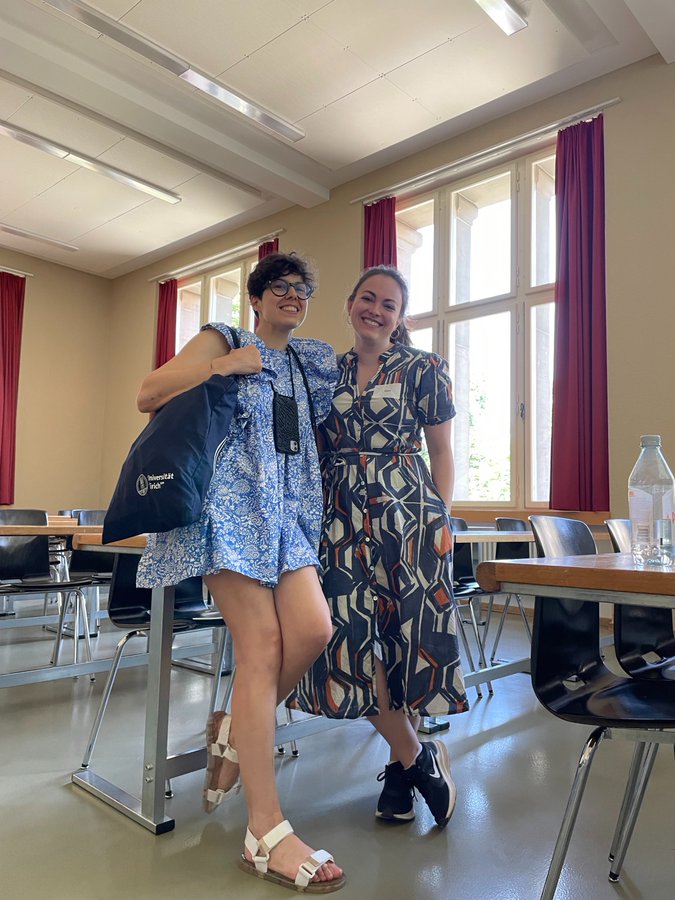
Student Presentations – Part 5
Now for Sessions 9 and 10! Session 9 includes papers by Merylin Das (Birla Institute of Technology and Science, Pilani, India) ‘Founding Gauhati University: A History of the Movement for a University in Assam (1917–1948)’ and Aino Kirjonen (University of Helsinki, Finland) ‘Campus Spaces and Educational Experiences in Elite US Colleges, 1890–1914’.
Session 10 Anne Por (Leiden University, The Netherlands) has discussing ‘Metaphors in 18th- and 19th-Century Student Advice Literature: On the Task of Understanding University, Knowledge and Learning in the German Lands’ and Emmanuelle Vollenweider (Geneva University, Switzerland) talks about ‘Teaching Reading Literary Texts to Different Student Population: History of Representations in Romandy (1880–1980)’.
Student Presentations – Part 6
The final postgrad session of HEDSS2023 is Session 11 featuring papers from Daniela Mansi (Universidad Nacional de La Plata, Argentina) ‘Teacher Training in Physical Education for Children: Discourses on Pedagogy and Childhood (Argentina, 1963–1983)’ as well as Elske de Waal (Utrecht University, The Netherlands) ‘Teacher Knows Best – On the Role of Teachers and Their Knowledge in Academic Settings’ and Adrian Weiss (University of Kassel, Germany) ‘The Methodic-Critical Comrade’ as a Subtype of the East German Teacher Habitus’.
Workshop 3 – Assessing Children’s Writing: Experience, Discourse and Interiority?
And the final workshop of the summer school is given by HES UK’s own Tom Woodin! We will be looking at ‘Assessing Children’s Writing: Experience, Discourse and Interiority?’.
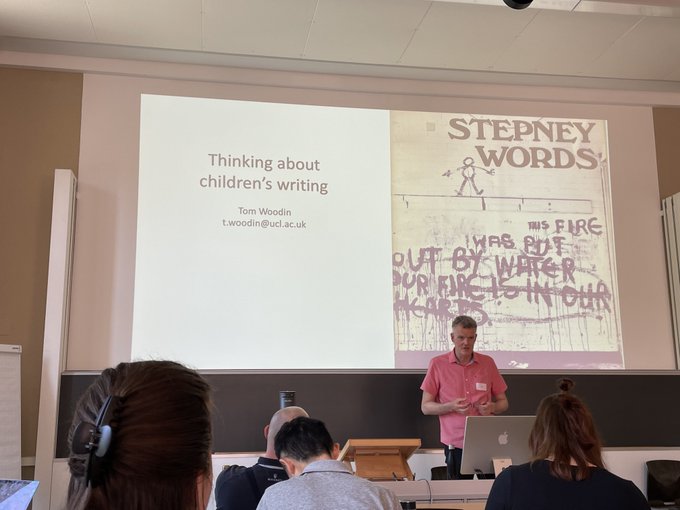
We started discussing the questions ‘what is creative writing?’ and ‘what are your experiences with creative writing?’. For me, I have discovered that I can and must write creatively for my research. To get to the experience of medieval women when they are not within the records, I have to consider the various different experiences that may have taken place.
Myself and Ana Mafalda also felt that writing creatively can mean stepping out of your comfort zone. To be creative sometimes, you have to try something new. There were also discussions about creative writing as being a part of childhood, something that we sadly have to leave behind as we grow up. Within writing creatively, there can be a sense of tension and self consciousness – what will other people think?
THE END
And just like that it’s the end of HEDSS2023! Time has flown by! Already missing all my new pals, but I’m sure we’ll see each other again soon. Thank you for following my adventures in Zurich!
Thank you to the local organisers Anna Bosche, Lukas Boser, Patrick Bühler, Frederik Herman and Michèle Hofmann for really making this weekend so special.
Thank you to the tutors Ian Grosvenor, Björn Norlin, Lisa Rosén Rasmussen, Lilli Riettiens, Sian Roberts, Angelo Van Gorp and Tom Woodin for their feedback, guidance and workshops.
And, of course, thank you to my amazing PhD peers for sharing their research. Together, we all made a safe and supportive environment to discuss our work and have fun.
This isn’t goodbye, it’s just see you later for the HEDSS2023 cohort.
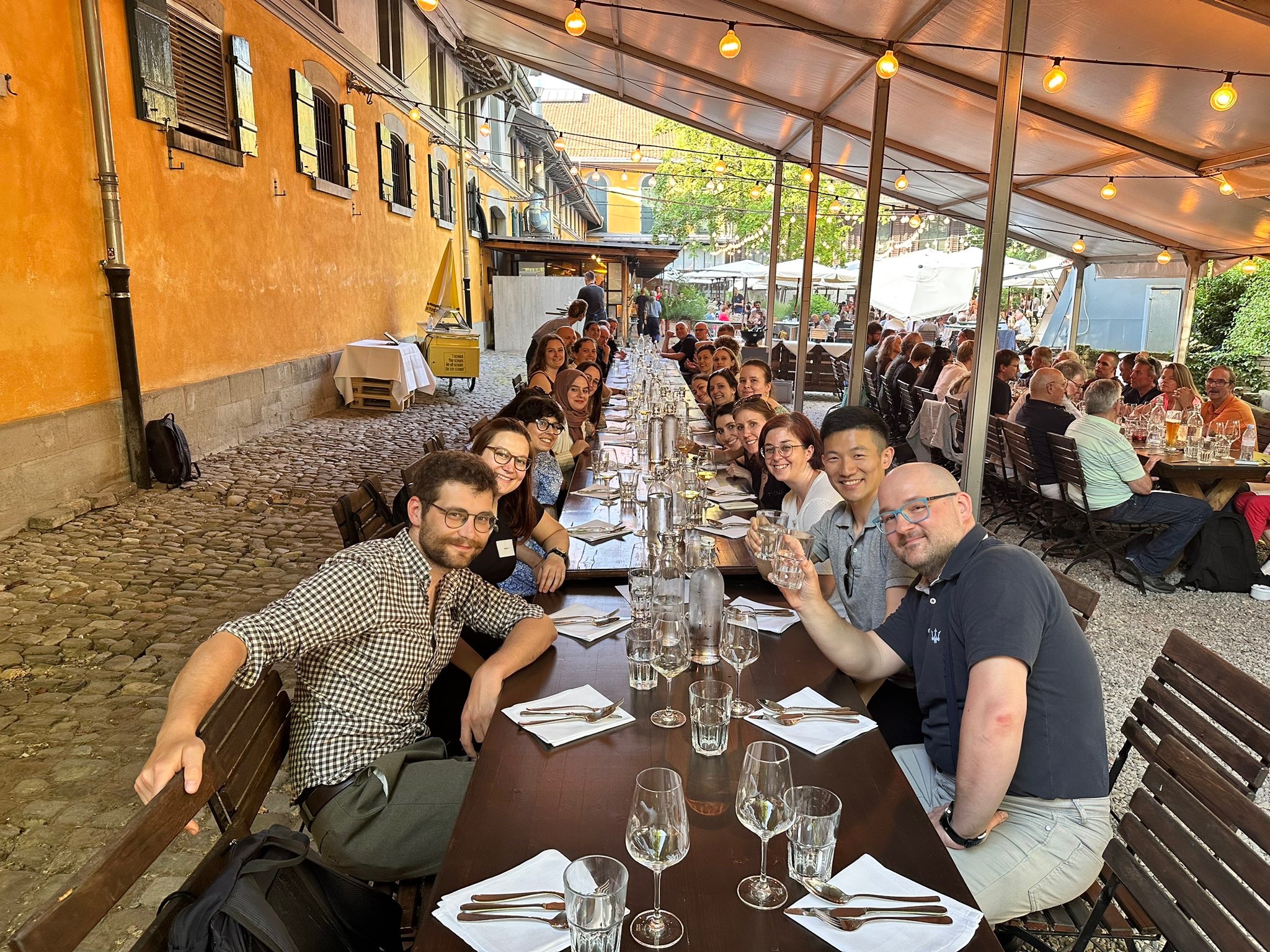
Applications are now open for the 14th History of Education Doctoral Summer School which will be taking place at the Danish School of Education, Campus Emdrup in Copenhagen, Aarhus University, Denmark, from 6th-8th June 2024.
You can find out more about next year’s HEDSS and how to apply here.
Elena Rossi is a final year DPhil candidate in History at Magdalen College, Oxford, and a Scouloudi Fellow at the Institute of Historical Research. Her research considers how women encountered worlds of learning in the university towns of Oxford, Paris and Bologna from c. 1270-1500. She has been the Peter Gosden Fellow for the History of Education Society since January 2022 and she attended the History of Education Doctoral Training Summer School in Zurich, Switzerland, in June 2023.
